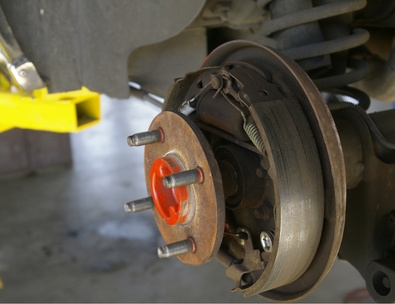
Car brake repair is one of the largest components of the auto repair industry. Not every squeak you hear is a problem, however. Learn to identify what the sounds mean and you may save yourself some money.
In normal operation, auto brakes produce dust from the grinding and pressure associated with the braking process. Over time, this dust can build up and cause spacing between the brake rotor and pads resulting in a squeaking sound when the brakes are applied. Typically, the most dust accumulates on the front wheels as they tend to take the bulk of the car's weight when stopping.
You may notice after your car has been sitting for a while, after being washed or a rain shower, the brakes squeak during the first few applications. This is due to a thin layer of rust which can form in as little as a few hours on the brake rotors. You will find the noise stops after the rust has been worn off by normal braking.
Small metallic elements are added to the edge of the brake pad material during the manufacturing process. When most of the pad has worn away, these elements are exposed and begin to rub on the rotor, producing a loud shrieking sound which is hard to ignore. These cause no damage to the car or brakes but should be heeded as a notice to change the pads as soon as possible.
Brakes experience a lot of vibration in the stopping process. When installing new pads, mechanics are supposed to apply a vibration absorbing solution. The solution is usually successful in preventing any vibration squeak noises but on occasion, it is applied incorrectly or forgotten altogether, or even wears out. This is easily fixed by applying more solution to rear of the pads where they meet the piston and the guard plate.